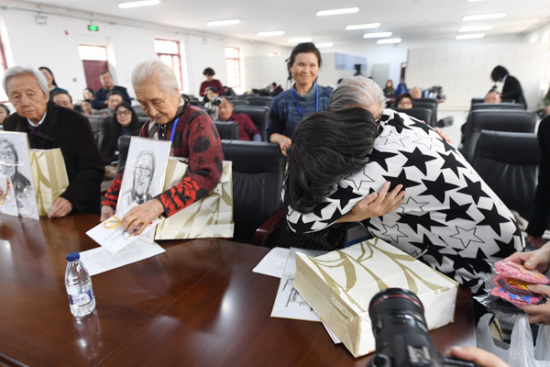
A group from Japan visits three Chinese women in Harbin on Tuesday who raised children abandoned by Japanese families after World War II. Three Japanese visitors had been among those children, but none had been raised by the women. (Photo by Liu Yang/China Daily)
A 41-person Japanese delegation, which included three war orphans, expressed hope for peace between the two countries, during a visit to China.
On Tuesday, Tomb Sweeping Day, the delegation paid a visit to an exhibition on the crimes committed by Unit 731 in Harbin, capital of northeast China's Heilongjiang Province.
Unit 731 was a Japanese biological and chemical warfare unit. Construction of the base began in 1935 during the Japanese occupation of northeast China.
"As it is Tomb Sweeping Day, we are here to remember the past," said Nakajima Yohachi, a "war orphan" and organizer of the trip.
"We are sparing no efforts to oppose war and cherish peace, and will continue to try our best to return the love and care received from our childhood," said Kasai Yasuo, another orphan.
After the war, many fleeing Japanese left their children behind, who were cared for by Chinese families. These children, although many are now at least in their seventies, are called war orphans.
The delegation also visited representatives of their Chinese foster parents on Tuesday, to express their gratitude.
Mu Wenxia, 98, said although she had long been criticized by raising a baby left by "the enemy," she never regretted it.
"While holding her in my arms, I just thought it was so pitiful that this poor little girl was left abandoned," said Mu.
Her 70-plus-year-old Japanese daughter was too ill to make the visit.
More than 4,000 Japanese children were left in China after Japan's defeat in 1945, mostly in the northeastern provinces of Heilongjiang, Jilin and Liaoning, as well as Inner Mongolia Autonomous Region.
The trip was organized by China Association for Friendship, and representatives from Japan-China Friendship Association were among the Japanese visitors.


















































